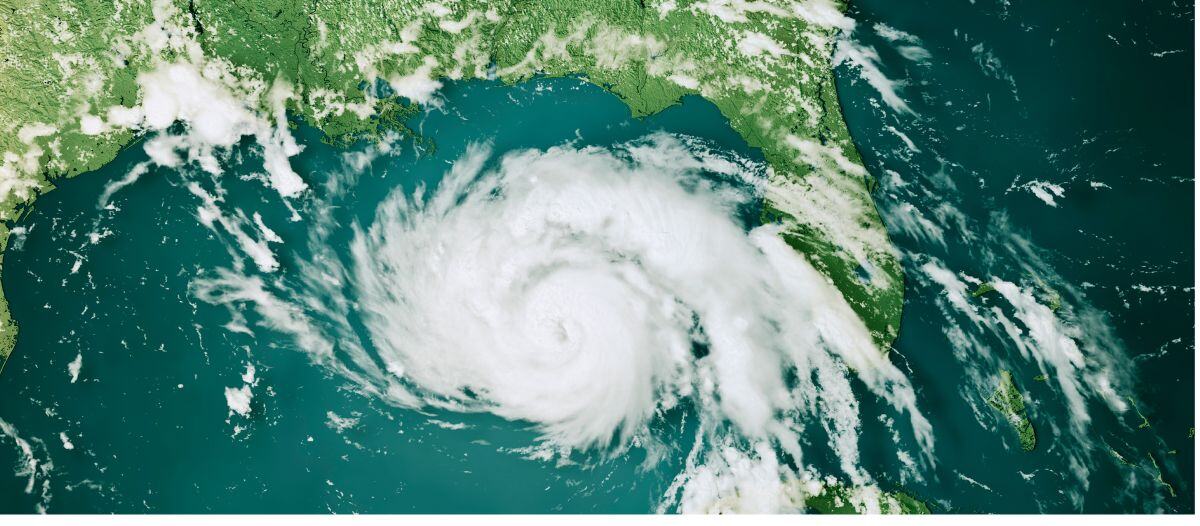Hurricane Damage
A comprehensive look at challenges & solutions

Hurricanes are among the most devastating and unpredictable natural disasters, and when they hit, facility managers are often the first line of defense. The FM team becomes responsible for managing everything from immediate safety concerns to long-term recovery efforts. An FM’s ability to anticipate, react and respond swiftly is crucial to ensuring the well-being of occupants and protecting valuable assets. However, they need time, space and resources to not only address the damage effectively but to craft long-term strategies that build resilience and reduce future risks.
FM’s role in hurricane recovery
1. Structural damage: The front line of defense
Hurricanes wreak havoc on building infrastructure with extreme winds, flooding and debris, often leaving significant damage in their wake. FMs must assess and prioritize repairs to ensure buildings are safe and secure. From roof damage and broken windows to water infiltration, these professionals are responsible for addressing a wide range of structural issues.
FMs do more than just repair — they work proactively to ensure buildings are stronger and more resilient after each storm. They analyze vulnerabilities, fortify weak spots and plan upgrades to minimize future risks. The level of expertise and foresight required to do this effectively is substantial, and it underscores the importance of giving FMs the resources and time they need to carry out these vital tasks.
Recognition moment: FMs often work around the clock after hurricanes hit, juggling multiple priorities to bring facilities back online. Their expertise ensures that repairs are done right, not just quickly.
2. Business disruption & downtime: Recovery coordination
When hurricanes strike, business operations often come to a grinding halt, whether due to power outages, structural damage or restricted access. FMs play a key role in minimizing downtime and getting businesses up and running again. Their role goes far beyond fixing buildings — they are integral to restoring normalcy for organizations.
FMs coordinate the recovery process with meticulous precision. They ensure that power is restored, communication systems are functional and access points are secure, allowing employees and clients to return safely. This level of coordination is a monumental task, yet it often goes unnoticed. Providing FMs with resources such as backup generators, robust communication systems and access to emergency services empowers them to mitigate business disruptions and reduce the financial impact of a hurricane.
Empowering Action: Businesses should invest in their facilities teams by equipping them with advanced technology and tools to manage crisis situations, ultimately ensuring quicker recovery and reduced financial losses.
3. Health & safety risks: Safeguarding people & property
FMs are the wards of health and safety in the event of a hurricane. Hurricanes introduce serious safety hazards: flooding can lead to mold growth; electrical systems can be compromised and structural weaknesses can pose dangers to anyone in the building. FMs are on the front lines, working to ensure that these risks are identified and mitigated as quickly as possible.
They oversee post-hurricane safety inspections, checking for hidden dangers like water damage, fire hazards or unstable structures. FMs are also tasked with coordinating evacuation protocols and ensuring buildings meet safety regulations before reopening.
Highlighting impact: FMs save lives by ensuring that buildings are safe to re-enter. Their dedication to these tasks is invaluable and often goes unrecognized, but their role is critical in creating safe environments post-disaster.
4. HVAC & utility system damage: Restoring critical infrastructure
After hurricanes, key systems like HVAC, plumbing and electrical utilities are often severely impacted, threatening to shut down entire operations, rendering buildings unusable. FMs not only assess the damage to these systems but also oversee their repair and restoration.
The complexity of managing these systems post-hurricane cannot be underestimated. Facility managers need access to detailed system records, preventive maintenance data and specialized contractors to ensure that critical infrastructure is restored efficiently. Their ability to manage these intricate systems highlights the importance of giving them the time and resources necessary to do their job properly.
Resourcing FM teams: Investing in preventive maintenance and ensuring that FMs have access to specialized resources, such as emergency contractors, ensures quicker recovery for essential building systems.
5. Grounds & landscaping: Clearing the path to safety
The damage hurricanes cause is not confined to buildings alone. The grounds surrounding a facility, including landscaping and access routes, are often littered with fallen trees, debris or other hazards. FMs must coordinate efforts to clear these areas, ensuring that entrances are accessible, and the grounds are safe for anyone entering the facility.
By prioritizing debris removal, FMs prevent secondary incidents like vehicle damage, accidents or blocked emergency exits. In the long term, they also make decisions about sustainable landscaping practices, planting resilient vegetation and designing drainage systems to handle flooding.
Praise point: FMs do not just focus on what is inside the building; they ensure the entire facility is functional, from the front door to the back gate. Their wide-ranging responsibilities demonstrate their versatility and dedication to safety and recovery.
6. Financial implications: Navigating insurance & claims
The financial burden of hurricane damage is enormous. FMs are often tasked with managing the complicated web of insurance claims, repair costs and long-term restoration efforts. FMs must meticulously document damage, manage contractors and navigate rising insurance premiums.
With access to the right tools, facility managers can expedite insurance claims, reducing delays in receiving the funds necessary for repairs. Their ability to manage the financial complexities of hurricane recovery highlights the need for businesses to give them both the time and resources to do their job effectively.
Financial recognition: FMs save organizations money by efficiently navigating the insurance landscape and finding cost-effective solutions for repairs. Their expertise in this area should be acknowledged and supported.
7. Environmental & sustainability concerns: Leading the way to safe recovery
Hurricanes often result in environmental hazards, such as chemical spills and water contamination. FMs play a key role in ensuring that the recovery process does not exacerbate these risks. They oversee the clean-up of hazardous materials, ensure compliance with environmental regulations and implement sustainable practices that minimize the long-term environmental impact.
By prioritizing eco-friendly recovery methods, FMs help organizations meet their sustainability goals while ensuring the recovery process is as safe as possible.
Sustainability highlight: FMs are environmental stewards, making decisions that not only address immediate risks but promote long-term sustainability and compliance. Their role in safeguarding the environment deserves recognition and support.
8. Long-term recovery & resilience: Preparing for the future
An FM’s work does not end once the immediate damage is repaired. Long-term recovery and resilience planning are key components of their role, ensuring that facilities are better prepared for future storms. Whether upgrading building materials, installing flood-resistant systems or fortifying critical infrastructure, FMs are constantly thinking ahead.
FMs use advanced facilities management software tools to streamline recovery efforts, track repairs and create workflows for ongoing improvements. These tools help them manage complex recovery processes and plan for future hurricanes. To support them in this role, organizations must give them the space and resources to implement long-term resilience strategies.
Forward thinking: FMs are visionaries who plan while addressing the present. Their ability to craft long-term strategies ensures facilities are better prepared for whatever comes next.
Hurricanes pose enormous challenges, but FMs are the backbone of recovery efforts, ensuring that buildings, people and operations are protected. Their work is multifaceted, requiring not just technical knowledge but strategic thinking, coordination and leadership. As organizations face increasing risks from natural disasters, it is essential that FMs are provided with the resources, support and recognition they need to succeed.
FMs do more than just react — they build stronger, more resilient facilities that can withstand future storms. By investing in their teams, providing them with the necessary tools, and allowing them the time and space to focus on comprehensive recovery efforts, organizations can minimize the impact of hurricanes and, when one hits, emerge stronger and more resilient. FMs are the unsung heroes of hurricane recovery. Giving them the recognition and support they deserve ensures that businesses, communities and infrastructure are well-prepared to face future storms with confidence.
In the end, it is not just about repairing what is broken; it is about building something better, stronger and more resilient, with FMs leading the way.

Fred Whipp is the vice president of business development at mpro5, the process management app and customer-first solution trusted by food service, retail and facility management. As an experienced business development executive who leads sales conversations with data, Whipp is an expert on best practices and digital transformation in FM.
Read more on Operations & Maintenance , Risk Management and Communication
Explore All FMJ Topics








